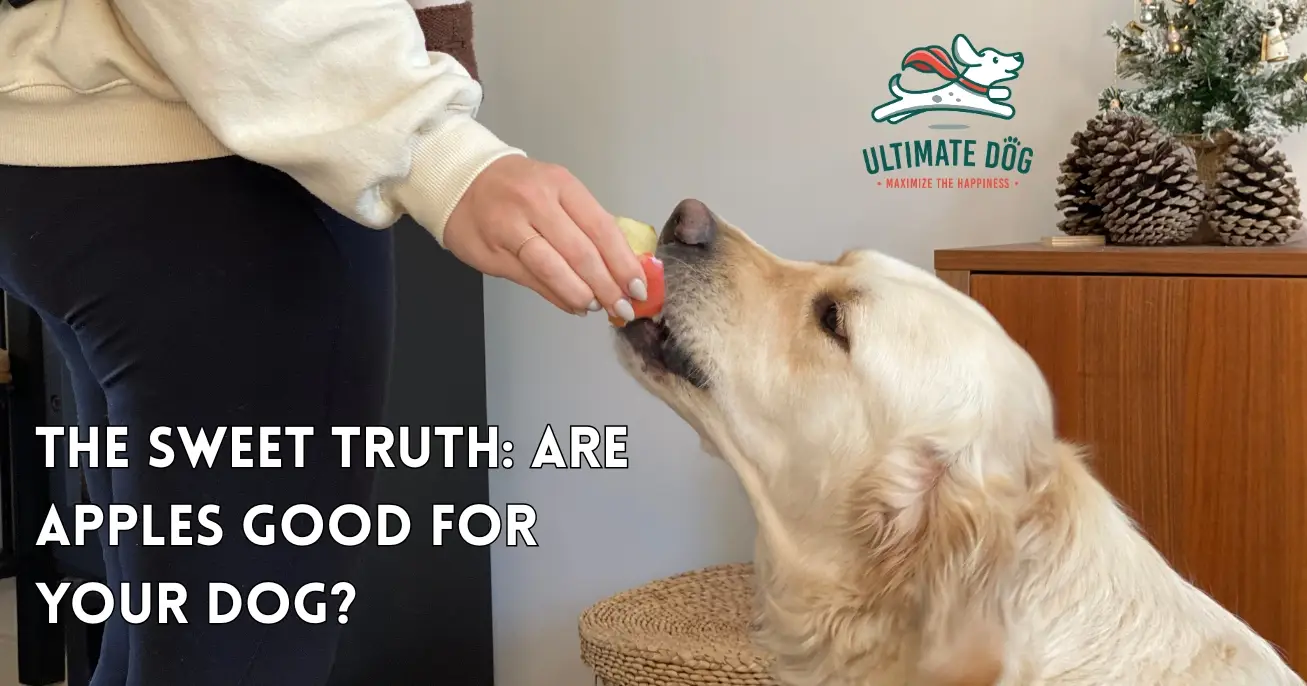TL;DR:
- Safe with proper prep: Remove seeds, core, and cut into appropriate sizes
- Health benefits: Vitamins A & C, fiber, antioxidants support immune and digestive health
- Portion control: 1-3 slices daily maximum (10% of total calories)
- Best varieties: Any common apple except crab apples; green apples have less sugar
- Red flags: Avoid if your dog has diabetes, food allergies, or digestive disorders
Picture this: you’re enjoying a crisp apple when your furry companion gives you those irresistible puppy dog eyes, silently begging for a taste. Your heart wants to share, but your mind races—are apples actually safe for dogs? We understand because we’ve been there, and the good news is that you’re asking exactly the right questions.
Are apples good for dogs? Yes, apples can be a wonderful, natural addition to your dog’s treat repertoire when prepared properly [2][4][5]. These humble fruits pack a nutritional punch with vitamins A and C, fiber, and powerful antioxidants that support immune function and digestive health. However, proper preparation is non-negotiable for safety.
Your dog deserves the best, and we’re here to help you navigate apple sharing with complete confidence. From understanding the science behind apple nutrition to mastering safe preparation techniques, this guide will transform you from a worried pet parent into an empowered advocate for your dog’s natural health. Natural, effective solutions for lifelong health start with making informed choices about every treat we offer our companions.
The Science-Backed Truth About Apples and Canine Health
We know how heartbreaking it can be to deny your pup a treat, especially when they’re looking at you with such hope and trust. The wonderful news is that apples, when properly prepared, offer genuine health benefits backed by trusted veterinary organizations [2][4][5].
The American Kennel Club and Purina have documented how apples contribute to immune system support and digestive health when incorporated thoughtfully into a dog’s diet [2][4]. These aren’t casual observations—they’re evidence-based findings from institutions that stake their reputations on accurate pet health information.
Key nutritional benefits include:
- Vitamin A: Supports eye health and immune function
- Vitamin C: Aids collagen production and provides antioxidant protection
- Fiber: Promotes healthy digestion and blood sugar regulation
- Antioxidants: Combat inflammation and cellular damage
The antioxidant content deserves special attention. Apples contain 200-300 milligrams of polyphenols per 100 grams, compounds that actively reduce inflammation throughout your dog’s body [7][6][9]. For dogs dealing with allergies, arthritis, or other inflammatory conditions, this natural anti-inflammatory support can be particularly valuable.
But here’s where responsible pet ownership shines—knowing the benefits is only half the story. Seeds must be removed due to trace amounts of cyanide, cores present choking hazards, and portion control prevents digestive upset [5][6][9]. When you understand these simple precautions, you transform a potentially risky situation into a safe, beneficial experience.
Essential Safety Protocol: Preparing Apples the Right Way
The beautiful truth about apple safety is that with proper preparation, risks become virtually negligible while benefits remain fully intact. Think of it like childproofing your home—a few simple, consistent steps create a safe environment where everyone can relax and enjoy.
Step-by-Step Safe Preparation:
- Wash thoroughly: Remove surface bacteria and pesticide residues, even if removing skin
- Remove core completely: Eliminate all seeds, stem, and tough central portions
- Cut appropriately: Create bite-sized pieces that encourage chewing without overwhelming
- Size for your dog: Thumbnail-sized for small breeds, thumb-sized for medium, slightly larger for large breeds
The Real Story on Apple Seeds
Let’s address the cyanide concern directly. Apple seeds contain amygdalin, which releases hydrogen cyanide when digested. However, a medium-sized dog would need to consume approximately 85 grams of seeds—equivalent to 200 whole apples—to reach potentially toxic levels [6][5][9].
This doesn’t mean we should be cavalier about seed removal. We remove seeds not because one or two would cause immediate harm, but because consistent safety habits eliminate even minimal risks and protect against accidental overconsumption.
Choking Prevention by Size
Small breeds (under 25 lbs): Thumbnail-sized pieces
Medium breeds (25-60 lbs): Thumb-sized pieces
Large breeds (over 60 lbs): Slightly larger, but still encourage chewing
Watch for choking signs: excessive drooling, pawing at mouth, difficulty swallowing, or obvious distress. Remove remaining apple pieces immediately if these occur.
Best Apple Varieties: Making Smart Choices
Nearly all common grocery store apples are safe when properly prepared—Fuji, Gala, Granny Smith, and others [1][3][5]. The one important exception: avoid crab apples entirely due to excessive acidity that can cause stomach upset [1][3].
Green vs. Red: The Nutritional Difference
Green apples (like Granny Smith):
- Lower sugar content (15-20g vs 19-25g in red varieties)
- Higher vitamin A concentration
- Better choice for diabetic dogs or weight management
- Tart flavor encourages thorough chewing
Red apples:
- Higher natural sweetness, more appealing to many dogs
- Still provide excellent nutritional benefits
- Good for dogs without sugar restrictions
For research-minded pet parents, green apples offer concentrated nutrition with less natural sweetness, while red varieties provide immediate appeal with higher sugar content.
Portion Control: The 10% Rule Made Simple
Is apple good for dogs in large quantities? No—treats should never exceed 10% of your dog’s total daily calories. For most dogs, this translates to 1-3 apple slices per day, depending on size and slice thickness [1][4][6].
A medium apple contains roughly 95 calories and 19 grams of natural sugar [4][5][6]. While these are natural sugars packaged with beneficial fiber, they still represent calories that must be accounted for in your dog’s daily intake.
Portion Guidelines by Size:
- Small breeds: 1 thin slice or a few small cubes daily
- Medium breeds: 1-2 slices daily
- Large breeds: 2-3 slices daily
- Puppies: Start with single small cubes, monitor closely
Signs of Overconsumption:
- Loose stools or diarrhea
- Excessive gas
- Stomach discomfort or restlessness
- Reluctance to eat regular meals
If these occur, withhold additional treats, ensure water access, and feed regular meals normally. Most dogs recover within 24-48 hours.
Special Health Considerations: When to Exercise Caution
While apples are ok for dogs in most cases, certain conditions require modified approaches or veterinary consultation before introduction.
Red Flags – Consult Your Vet First:
- Diabetes: Natural sugars can affect blood glucose levels
- Sensitive stomachs: High fiber may overwhelm irritated digestive systems
- Food allergies: Dogs with multiple sensitivities face higher risk
- Gastrointestinal disorders: Prescription diets may preclude treats
- Senior dogs: May need modified portions due to reduced chewing ability
Allergy Relief: The Quercetin Connection
Interestingly, apples contain quercetin—a natural antihistamine that can actually help manage allergic reactions [7][9]. This flavonoid stabilizes mast cells responsible for releasing histamine, potentially providing relief for dogs with environmental allergies.
However, some dogs may develop apple sensitivities themselves. Start with small portions and monitor for itching, digestive upset, ear infections, or skin irritation.
Organic vs. Conventional: The Eco-Conscious Choice
Conventional apples consistently rank among fruits with highest pesticide residue levels [7][8][9]. While considered safe, but not recommended for humans, dogs’ smaller body size and different metabolism raise legitimate concerns about chemical exposure.
Smart Shopping Strategies:
- Seasonal buying: Purchase organic during harvest season (September-November) for better prices
- Local orchards: Often competitive pricing with conventional supermarket varieties
- Thorough washing: If choosing conventional, scrub with vegetable brush under running water
- Storage: Properly stored apples maintain quality for weeks, maximizing bulk purchase value
Creative Serving Ideas: Beyond Basic Slices
Once you’ve mastered safe preparation, explore these engaging options:
Fresh Variations:
- Different cuts and shapes for variety
- Grated apple sprinkled over regular meals
- Thin slices for quick crunching vs. thicker pieces for extended chewing
Seasonal Treats:
- Summer: Frozen apple slices as natural “popsicles” for cooling relief
- Fall: Fresh orchard visits for peak flavor and nutrition
- Winter: Properly stored apples maintain treat availability year-round
Advanced Options:
- Homemade dehydrated apple chips (requires careful preparation)
- Apple pieces in puzzle toys for mental stimulation
- Training rewards using apple’s natural sweetness
The Holistic Wellness Approach
The most successful approach recognizes apples as one component of comprehensive wellness rather than a standalone solution. Are apples bad for dogs? Not when they complement high-quality nutrition, appropriate exercise, regular veterinary care, and mental stimulation.
Apples excel as natural, effective solutions for lifelong health when they enhance rather than replace foundational practices. Their vitamins, antioxidants, and fiber support nutritional foundations while their natural sweetness addresses psychological needs for variety and enrichment.
The sustainable aspects align beautifully with eco-friendly values—apples are renewable resources that can be sourced locally, reducing environmental impact while supporting agriculture. Their biodegradable nature means no packaging waste unlike synthetic treats.
FAQ: Your Most Common Apple Questions
Q: Are apples ok for dogs to eat daily? A: Yes, in appropriate portions (1-3 slices depending on dog size) as part of the 10% treat rule.
Q: Is apple ok for dogs with sensitive stomachs? A: Start with very small amounts and monitor closely. The high fiber content may overwhelm already-irritated digestive systems.
Q: Can puppies eat apples? A: Yes, but start with tiny portions (single small cubes) and monitor for digestive upset before gradually increasing.
Q: Are apple seeds really dangerous? A: While they contain cyanide compounds, toxicity requires consuming seeds from approximately 200 apples. Still, always remove for safety.
Q: Which apples are best for diabetic dogs? A: Green varieties like Granny Smith contain less sugar than red apples, but consult your veterinarian first.
Your dog deserves the best, and we’re here to help you provide natural, effective solutions for lifelong health through informed choices. We understand because we’ve been there—wanting to share the best with our furry family members while ensuring their safety remains the top priority.
By embracing this thoughtful approach to treat sharing, you’re not just feeding your dog—you’re nurturing a lifetime of health, happiness, and trust that will benefit both of you for years to come.
Sources
[1] Diamond, Aliyah. “Can Dogs Eat Apples? Here’s Everything You Need to Know” Pawlicy Advisor, 10/12/2020.
[2] “Fruits and Vegetables Dogs Can or Can’t Eat” American Kennel Club, 26/03/2024.
[3] “Can Dogs Eat Apples? Everything You Need To Know” Heads Up For Tails, 09/02/2022.
[4] “Can Dogs Eat Apples? A Guide to Safety” Purina, 23/05/2018.
[5] Arford, Kaitlyn. “Can Dogs Eat Apples?” American Kennel Club, 26/03/2024.
[6] Joy, Hector DVM. “Can Dogs and Puppies Eat Apples? Are Apples Good for Dogs?” PetMD, 14/12/2022.
[7] Seilis, Alex. “Are Apples Good for Dogs?” Dogs Naturally Magazine, 26/01/2024.
[8] “How ‘Bout Them Apples? Can Dogs Eat Apples” Fruitables Pet, 28/10/2024.
[9] “Can Dogs Eat Apples?” Natures Menu, 2023.

AI-researched and drafted article. Reviewed, edited, and certified by Daiva Rizvi, NC, BCHN, CCH.
Daiva Rizvi is a Board-Certified Holistic Nutritionist and a Board-Certified Classical Homeopath (for humans). As Chief Formulator for Ultimate Dog and creator of the CHIRP allergy supplement for dogs, she brings her passion for natural healing to pet wellness. Learn more about Daiva here https://oldcountrywellness.com





Leave a Comment